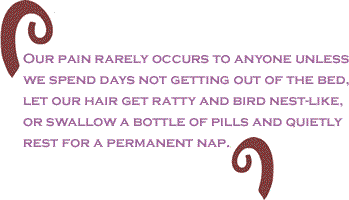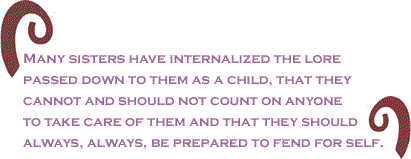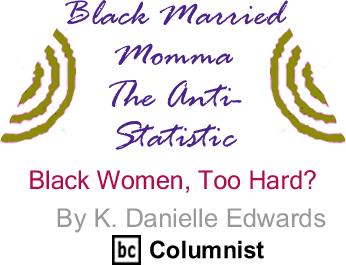| If
you�re a black woman, those odds are you�ve heard some incarnation
before of this statement: �Black women are too hard, too tough,
too difficult.� It may have been part of the lead-in to the punch
line of a joke. It might have been words shouted out in anger with
an ex. It could have been the �company line� mindlessly uttered
by black men who choose not to date black women.
And, deep within, it could very well be the drumbeat to which we
unconsciously step, in time, our lives synchronized with its rhythms
for reasons we don�t understand or don�t want to think about.
Sometimes we sisters hit a wall. There are times when we are too
tired, too strained, too pushed, too shoved, too pressured, too
giving, too planned-out, too methodical, too tactical, too overworked,
too overburdened, too sleepy, too poorly nourished, too broke, too
in debt � that it just all becomes too much. Between the covert
criticism and pinpricks of mental and emotional assaults we face
on any given day � between the workplace, the media, our families,
our society, our sub-culture � it can all snowball and leave a black
woman feeling like rolling down the hill without a fight is better
than feeling like one is fighting, battling or waging against something,
some force, practically all the time.
Typically, most folks are none the wiser when we reach this point.
Of course, that�s part of why we hit these walls as well. Our pain
rarely occurs to anyone unless we spend days not getting out of
the bed, let our hair get ratty and bird nest-like, or swallow a
bottle of pills and quietly rest for a permanent nap.
Black women are just like every other group of women on the planet,
but we�re different. We want to be loved and feel protected and
provided for. We want to be doting to our children and serene and
soft to our men. We want to be free and feminine. We want to laugh.
We want to smile. We want to know what it�s like to be happy more
than fatigued, angry, despondent or critical.
Unfortunately, unlike most other groups of women in this world,
black women are not entitled or free to be � just we. Any listen
to Ty Gray El�s �A Black Woman�s Smile� paints
a sobering, poignant and tragic literary and visual picture of where
we�ve been and how we�ve become. When other women were vaunted for
their beauty, we were told we were the scum of the earth and violated
for our virginity. When other women were permitted to focus on home
and hearth, we were scrubbing their homes and hearths. When other
women are upheld by their men, we always find no shortage of our
very own brothers who are all too willing to be our baiters and
traitors.

In my mind, I was once a little judgmental and critical when I saw
sisters slouching around like they didn�t give a damn. I raised
my eyebrows when I saw them looking angry, not speaking when spoken
to, looking dejected and completely unaffected. I wondered why they
didn�t respect themselves, why they couldn�t get on with it and
keep it moving, why they couldn�t love themselves and see their
beauty.
But now I kind of get it.
We are living in a world in which many of us are not merely treated
like shit on some level on a pretty consistent basis; we are also
living in one that, at many turns, shows us and tells us we aren�t
shit at the same time.
Has anyone ever compared a nationally known woman, an international
symbol of our nation, to a monkey and gotten away with it without
issuing a formal apology or atoning in some manner?
Point made.
So, today I asked myself if the stereotype about black women being
hardened rings true for me. On the surface, it doesn�t. I am feminine.
I wear dresses and heels to work. I smile at folks and greet people
before being spoken to. I exercise and haven�t let myself go. My
hair is now long.
But all that�s just appearances.
Many sisters have internalized the lore passed down to them as a
child, that they cannot and should not count on anyone to take care
of them and that they should always, always, be prepared to fend
for self. Therefore, they�ve always functioned as though they were
single, whether in a relationship, single or married. They�ve always
pulled their own weight and looked side-eyed at anyone who deigned
to suggest that they surrender their autonomy and the hedge that�s
been constructed around them for self-preservation. They�ve never
seen a black woman being cared for and not, at some point, fucked
over. They have daily worries that are the occasional nightmares
of other races of women.
Being a black woman . . . is just . . . different.
So, yes, today I am resigning to the idea that there may be a bit
of truth to the accusation that we�re a bit tough, sometimes critical,
even a little hard. But we are a group of women who are dealing
with dynamics historically and socially that no other group of women
on these shores has faced or is facing.

Maybe once we admit that, examine our history and stop pretending
we like being bulletproof and ironclad, we can heal as a community
of women and as a people.
BlackCommentator.com
Columnist K. Danielle Edwards is a Nashville-based poet,
writer, blogger, adjunct professor and communications professional,
has had works featured in or on National Public Radio, The Root,
The Washington Post, Mythium Literary Journal, Black Magnolias Literary
Journal, MotherVerse Literary Journal, ParentingExpress, Mamazine,
Mamaphonic, The Black World Today, Africana.com and more. She has
authored a novella-memoir, Stacey Jones: Memoirs of Girl & Woman, Body & Spirit,
Life & Death (2005). Click
here to contact Ms. Edwards. |




















































